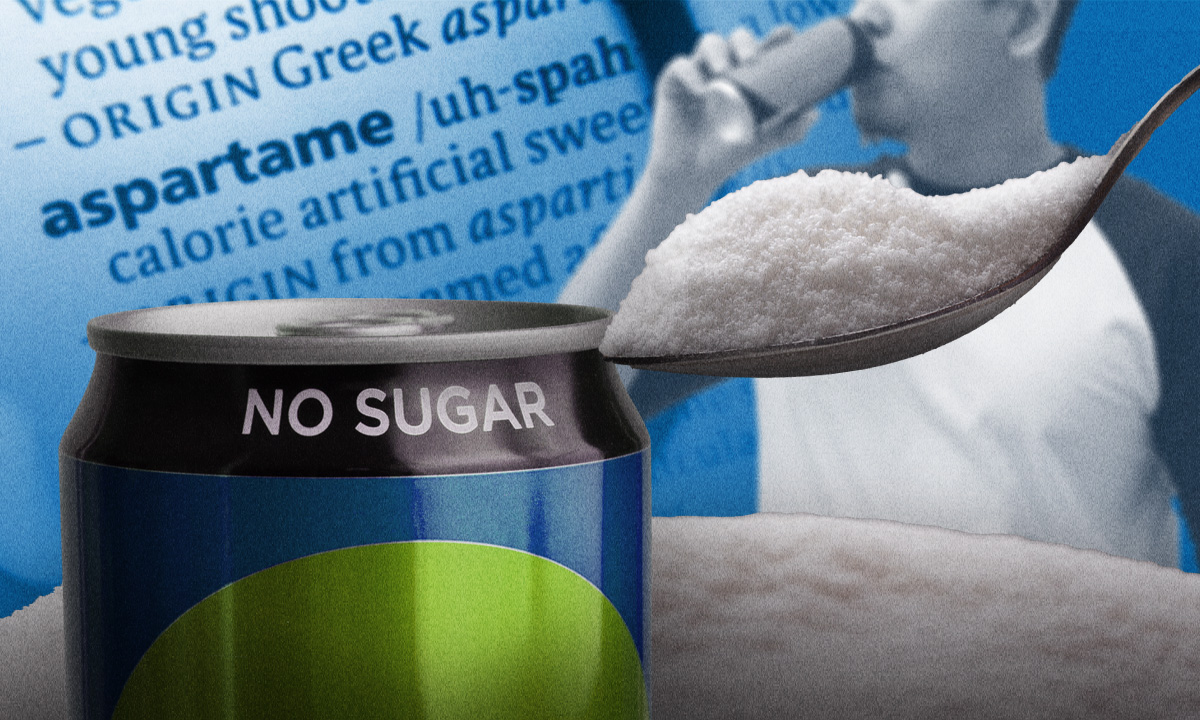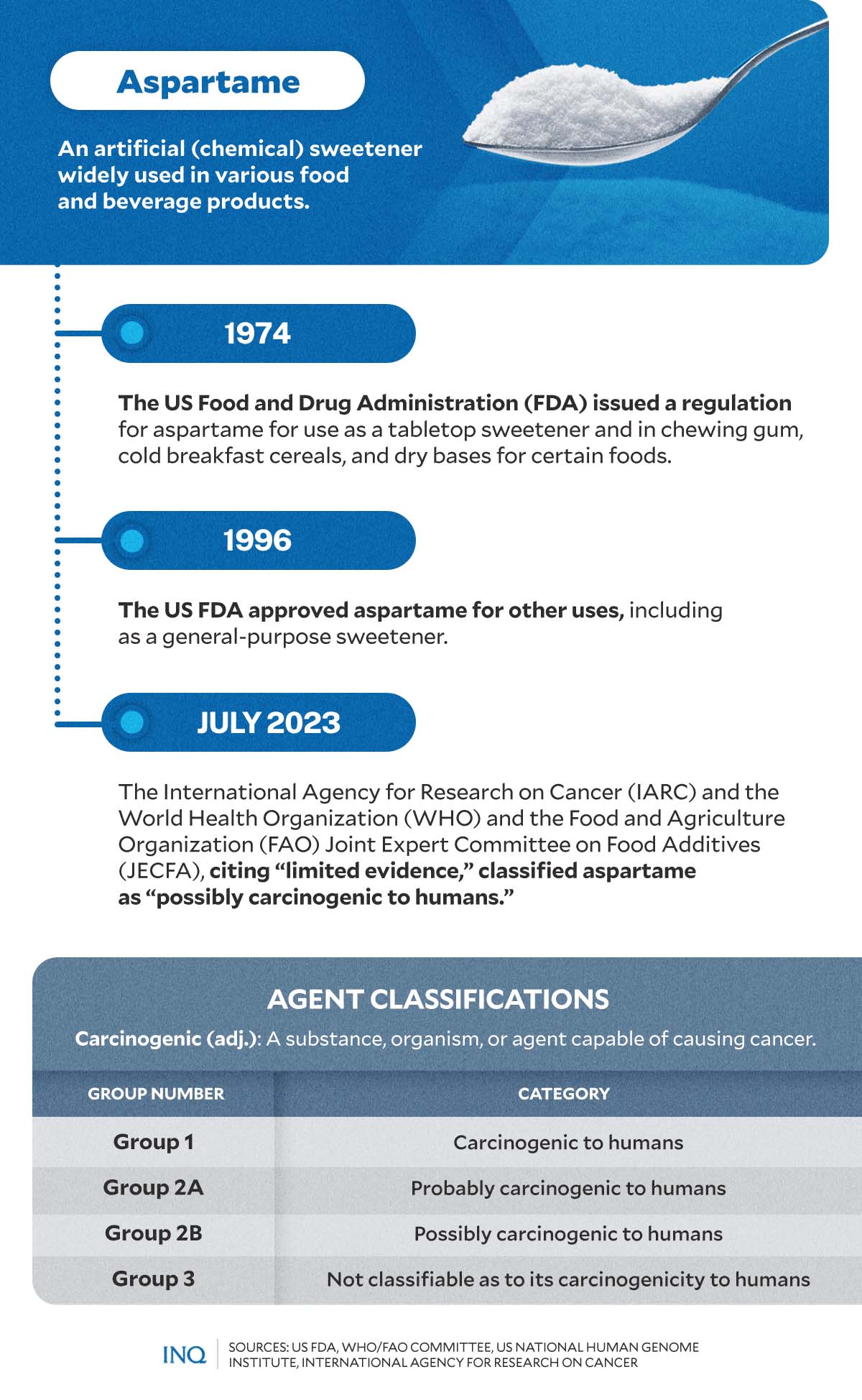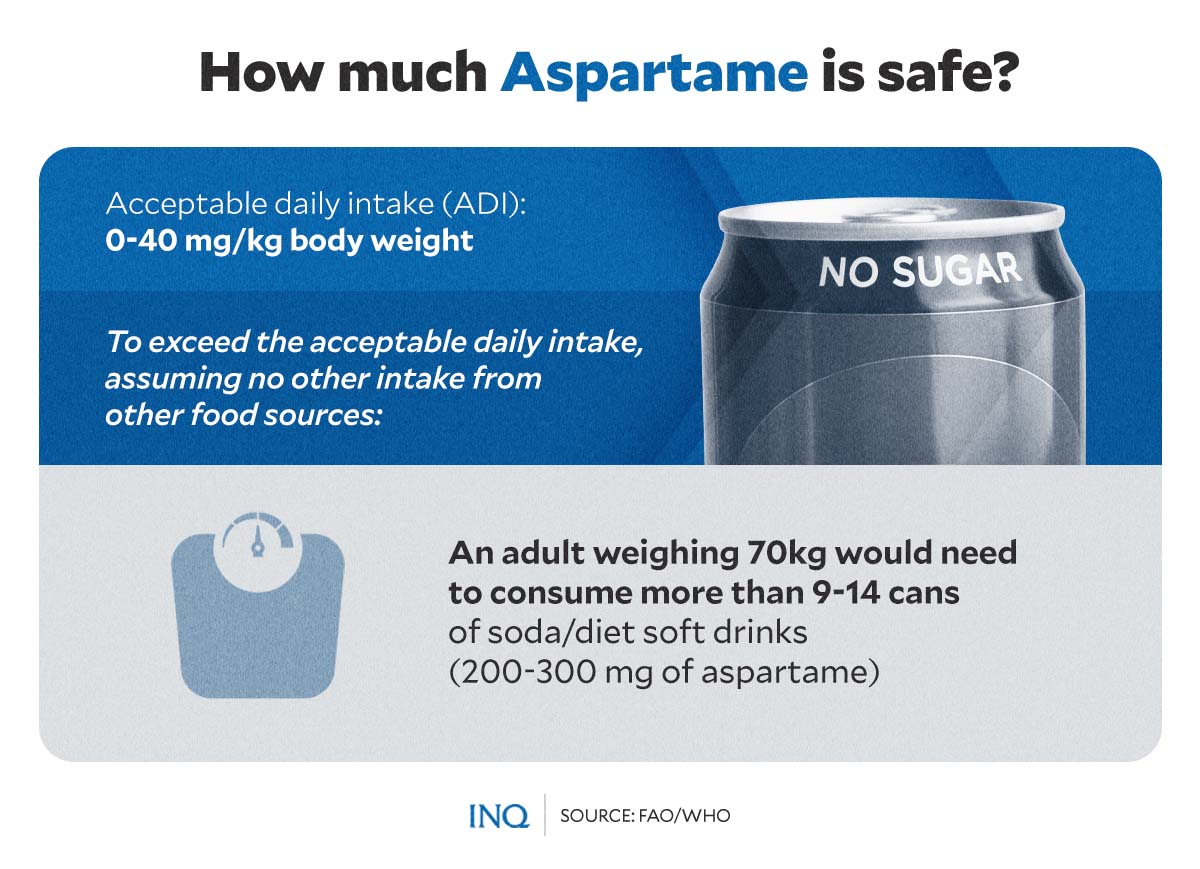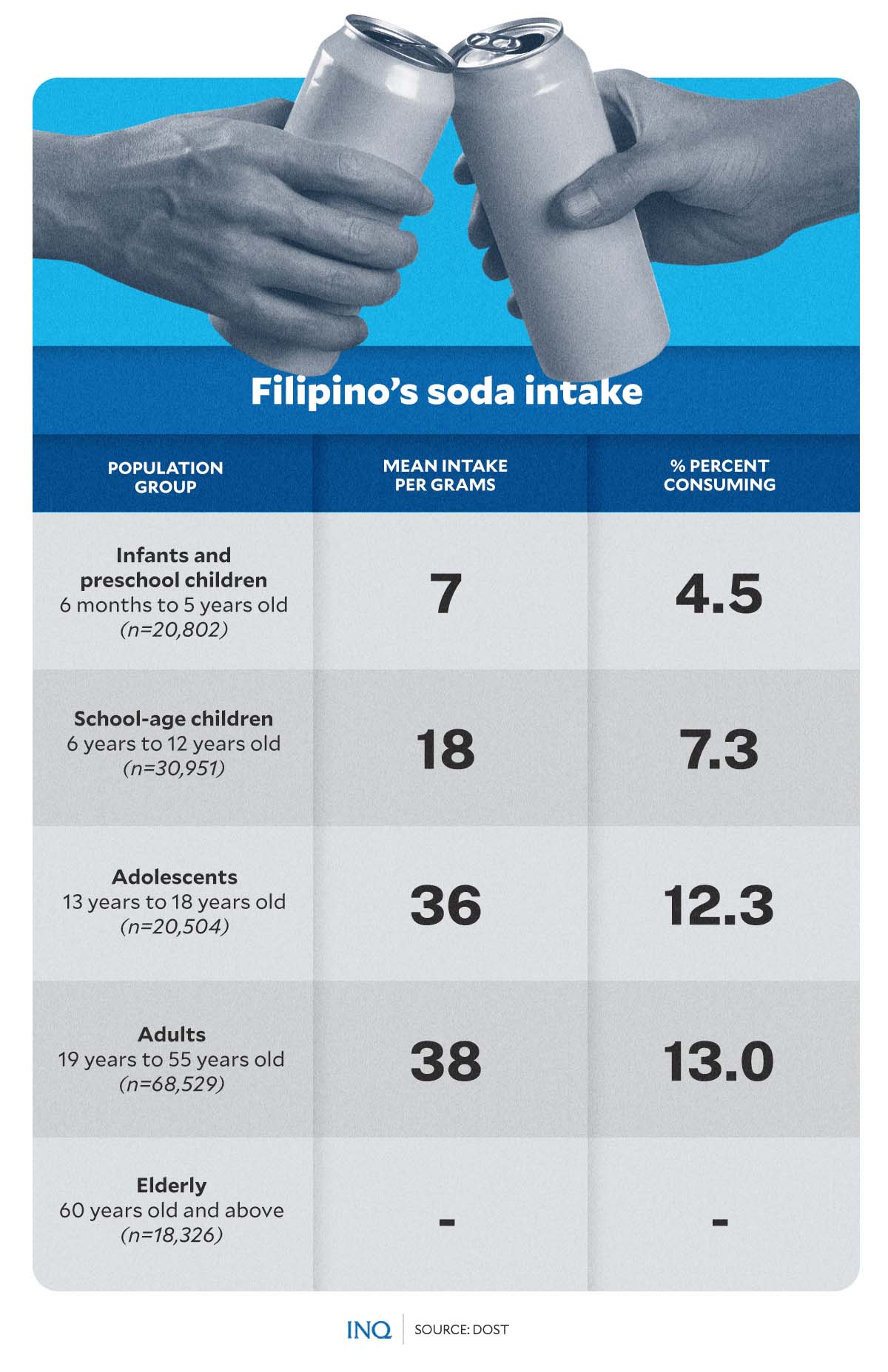Aspartame: Carcinogenic or safe?
MANILA, Philippines—Aspartame, an artificial sweetener widely used in various food and beverage products, has been classified by the cancer research arm of the World Health Organization (WHO) as “possibly carcinogenic”—what does this mean?
On July 14, the International Agency for Research on Cancer (IARC), WHO and Food and Agriculture Organization (FAO) Joint Expert Committee on Food Additives (JECFA) released assessments of the health impacts of aspartame.
As described by WHO, aspartame is an artificial sweetener widely used in everyday food and beverage products like diet drinks, chewing gum, gelatin, ice cream, dairy products (yogurt, cereal, toothpaste) and some medication.
In the 1970s, the US Food and Drug Administration (FDA) regulated aspartame as a tabletop sweetener. A few years later, in 1996, the regulating body approved aspartame for other uses, including as a “general purpose sweetener.”
After reviewing scientific literature, the IARC classified aspartame as possibly carcinogenic “on the basis of limited evidence for cancer in humans,” specifically for a type of liver cancer.
Article continues after this advertisementIARC also noted limited evidence for cancer in experimental animals and limited evidence related to the possible mechanisms for causing cancer.
Article continues after this advertisementThis decision placed aspartame in Group 2B, a classification of agents that are possibly carcinogenic but with limited to insufficient evidence.
Among previously evaluated agents classified under Group 2B include gasoline and gasoline engine exhaust, welding fumes, pickled vegetables, and aloe vera whole leaf extract.
The IARC Working Group classifies agents from “carcinogenic to humans” to “not classifiable as to its carcinogenicity.”
Should I adjust my daily intake?
In 1981, JECFA recommended an acceptable daily intake (ADI) of 40 milligrams of aspartame per kilogram of body weight.
In its latest assessment, JECFA concluded that the data indicated no sufficient reason to change previously established ADI. The committee reaffirmed that it is safe for a person to consume within the daily limit.
This means that an adult weighing 70 kilograms would need to consume more than 9-14 cans of diet soft drinks (containing 200-300 milligrams of aspartame) per day to exceed the acceptable daily intake, assuming no other intake from other food sources.
JECFA, according to Dr. Morez Sanaa of WHO, “also considered the evidence on cancer risk…and concluded that the evidence of an association between aspartame consumption and cancer in humans is not convincing.”
“We need better studies with longer follow-up and repeated dietary questionnaires in existing cohorts,” Sanaa said.
“We need randomized controlled trials, including studies of mechanistic pathways relevant to insulin regulation, metabolic syndrome, and diabetes, particularly as related to carcinogenicity,” Sanaa said.
According to WHO, JEFCA’s risk assessments determine the probability of a specific type of harm—for example, cancer—to occur under certain conditions and levels of exposure. It noted that it is not unusual for JEFCA to factor IARC classifications into its decisions.
In the Philippines, an Expanded National Nutrition Survey (ENNS) published by the Department of Science and Technology-Food and Nutrition Research Institute (DOST-FNRI) found that soft drinks were among the top 30 food items commonly consumed by various population groups.
The beverage, which contains aspartame, was popular among school-age children (6-12 years old), adolescents (19-59 years old), and adults (19-59 years old).
Alarmingly, 4.5 percent of the over 20,000 survey respondents categorized as infants and preschool children group (6 months old-5 years old) listed soft drinks among their commonly consumed food items.
What does the classification mean?
The recent classification made by IARC, however, does not assess the level of risk that a particular agent—in this case, aspartame—causes cancer in humans.
While WHO’s cancer research arm noted that the categories “indicate the strength of the evidence as to whether an agent is capable of causing cancer”—also called “hazard”—it clarified that the categories do not measure the likelihood that cancer will occur at a particular level of exposure to the agent.
“When you get down to the other groups, it becomes clear that merely having an IARC classification doesn’t always pose a cause for concern,” said Andy Brunning, a UK-based chemistry advisor and creator of Compound Interest—a blog that publishes infographics and articles related to chemistry.
“Substances like pickled vegetables are classified as ‘possibly carcinogenic’ simply because the evidence isn’t strong enough one way or the other. In fact, any substance or exposure tested by the IARC gets put into one of these five groups,” he added.
Brunning stressed that IARC’s classification system tells the public nothing about the relative increases in cancer risk from the agents or substances it classifies. He described the system as “more frequently misleading than helpful.”
Other scientists have also aired their sentiments, some of which did not hold back on criticizing the IARC’s evaluations and classification—which, in the past years, has labeled red meat alongside carpentry, working at night, and using cellphones as possible, probable, or definitely carcinogenic.
“Classification alone is, at most, useless and in several cases—like in this case—is dangerous,” Angelo Moretto, a professor at the department of cardiothoracic and cardiovascular sciences and public health at the University of Padua in Italy, told science magazine Scientific American.
As explained by WHO, evaluations of the impact of aspartame made by the IARC and JEFCA were based on scientific data collected from various sources, including peer-reviewed papers, government reports, and studies conducted for regulatory purposes.
IARC and JEFCA conducted independent but complementary reviews to assess the potential carcinogenic hazard and other health risks associated with aspartame consumption.
“The studies have been reviewed by independent experts, and both committees have taken steps to ensure the independence and reliability of their evaluations. […] This was the first time that IARC has evaluated aspartame and the third time for JECFA,” said WHO.
‘Don’t panic’
In a separate online publication, Moretto and his colleagues have previously likened the IARC to the supercomputer “Deep Thought” featured in “The Hitchhiker’s Guide to the Galaxy,” a 1979 classic sci-fi by Douglas Adams.
In the novel series, Deep Thought discovered that the ultimate answer to life, the universe, and everything is “42,” yet no one could remember what the question was.
“Like ‘Deep Thought,’ the International Agency for Research on Cancer (IARC) Monograph program seems to have gone down the same path, creating an answer that seems to apply to almost everything, while forgetting the reason for the question,” the scientists said.
“Pronouncements from the program are met with understandable concern, sometimes bordering on panic, as nearly everything it reviews is deemed to be some level of ‘carcinogenic to humans’,” they continued.
“It wouldn’t be strange to start feeling anxious about all this and wondering if, we’re all, in fact, doomed. But as another famous line from The Hitchhiker’s Guide to the Galaxy tells us, ‘Don’t Panic.’”
TSB
RELATED STORIES:
Liver cancer, diseases: A silent epidemic in PH
PH food biz group: No aspartame in our products
Aspartame, the Silent Killer? W.H.O. Warns of Cancer Connection



